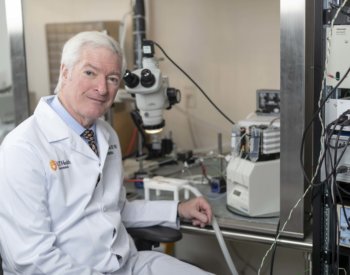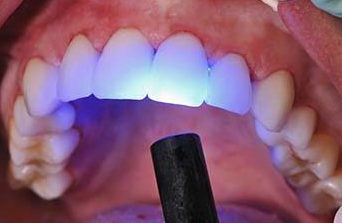SAN ANTONIO (March 23, 2020) — Although the American Dental Association has recommended that dentists postpone elective dental procedures during the COVID-19 outbreak, some patients with serious dental conditions or pain must still be seen.
Endodontists, specialists that make up 3% of dentists, will likely provide care for many of the most serious cases, including dental infection, pain and trauma.
Because the new coronavirus is transmitted through respiratory droplets when a person coughs or sneezes, and dentists work in the oral cavity, new guidance was needed for dental care.
To meet this need, a team of faculty members and dental residents from the Department of Endodontics in the School of Dentistry at The University of Texas Health Science Center at San Antonio (UT Health San Antonio) wrote new national guidelines that are now published on the American Association of Endodontists website.

“While the CDC provides general guidance for infection control, guidelines specific to procedures that might generate aerosols are not specified anywhere,” said Kenneth Hargreaves, D.D.S., Ph.D., professor and chair of the Department of Endodontics.
“Given that this is a rapidly spreading global pandemic, it requires new prescreening and treatment protocols not previously encountered by most dentists,” added Nikita Ruparel, D.D.S., M.S., Ph.D., associate professor of endodontics.
“A community-spread pattern of COVID-19 in China and its rapid spread to other countries made us realize the graveness of the situation. Having the crucial information that the disease spreads by droplets or contact and can be curbed by social distancing, our group felt the need to come up with clear guidelines to screen patients and emphasize restricting dental services to provide emergency care in order to help flatten the curve,” explained Amber Ather, B.D.S., D.D.S., endodontics resident at UT Health San Antonio.
“During these unprecedented times we advise patients and dentists not to panic and to follow all guidelines. All precautions should be taken to protect patients, dentists and their families. With this in mind, and due to dentists working in patients’ oral cavities and the given risks, only the most serious dental problems should be cared for now,” added Biraj Patel, B.D.S., another endodontics resident who contributed to the guidelines.
General guidance
Providers are encouraged to assess the seriousness of the dental concern when a patient calls for an appointment and prescribe antibiotics or pain medications, such as acetaminophen, if needed, for temporary relief.
Treatment for patients with confirmed COVID-19
If a patient has confirmed COVID-19 infection and must receive treatment, the guidelines recommend that special arrangements be made to provide care in a negative pressure room with the dental professional wearing personal protective gear.
Patients should use a special mouth rinse to reduce the concentration of the virus in the mouth prior to the procedure. Dental professionals are advised to use disposable dental instruments and employ imaging that does not need to be placed in the mouth to reduce the possibility of the patient coughing. The guidelines recommend against using ultrasonic instruments and high-speed handpieces which could cause the virus to become airborne.
Clinic staff are advised to disinfect surfaces in the operatory according to the latest guidance.
Endodontics team
The guidelines were written by dental residents Amber Ather, B.D.S., D.D.S., and Biraj Patel, B.D.S.; and faculty members Nikita B. Ruparel, M.D.S., D.D.S., Ph.D., Anibal Diogenes, D.D.S., M.S., Ph.D., and Kenneth M. Hargreaves, D.D.S., Ph.D., all from the Department of Endodontics at UT Health San Antonio.
To read the new guidelines, visit: https://www.aae.org/specialty/clinical-resources/coronavirus-disease-19-covid-19-implications-for-clinical-dental-care/.
# # #
The University of Texas Health Science Center at San Antonio, dba UT Health San Antonio, is one of the country’s leading health sciences universities and is designated as a Hispanic-Serving Institution by the U.S. Department of Education. With missions of teaching, research, patient care and community engagement, its schools of medicine, nursing, dentistry, health professions and graduate biomedical sciences have graduated more than 37,000 alumni who are leading change, advancing their fields and renewing hope for patients and their families throughout South Texas and the world. To learn about the many ways “We make lives better®,” visit www.uthscsa.edu.
Stay connected with The University of Texas Health Science Center at San Antonio on Facebook, Twitter, Instagram and YouTube.


